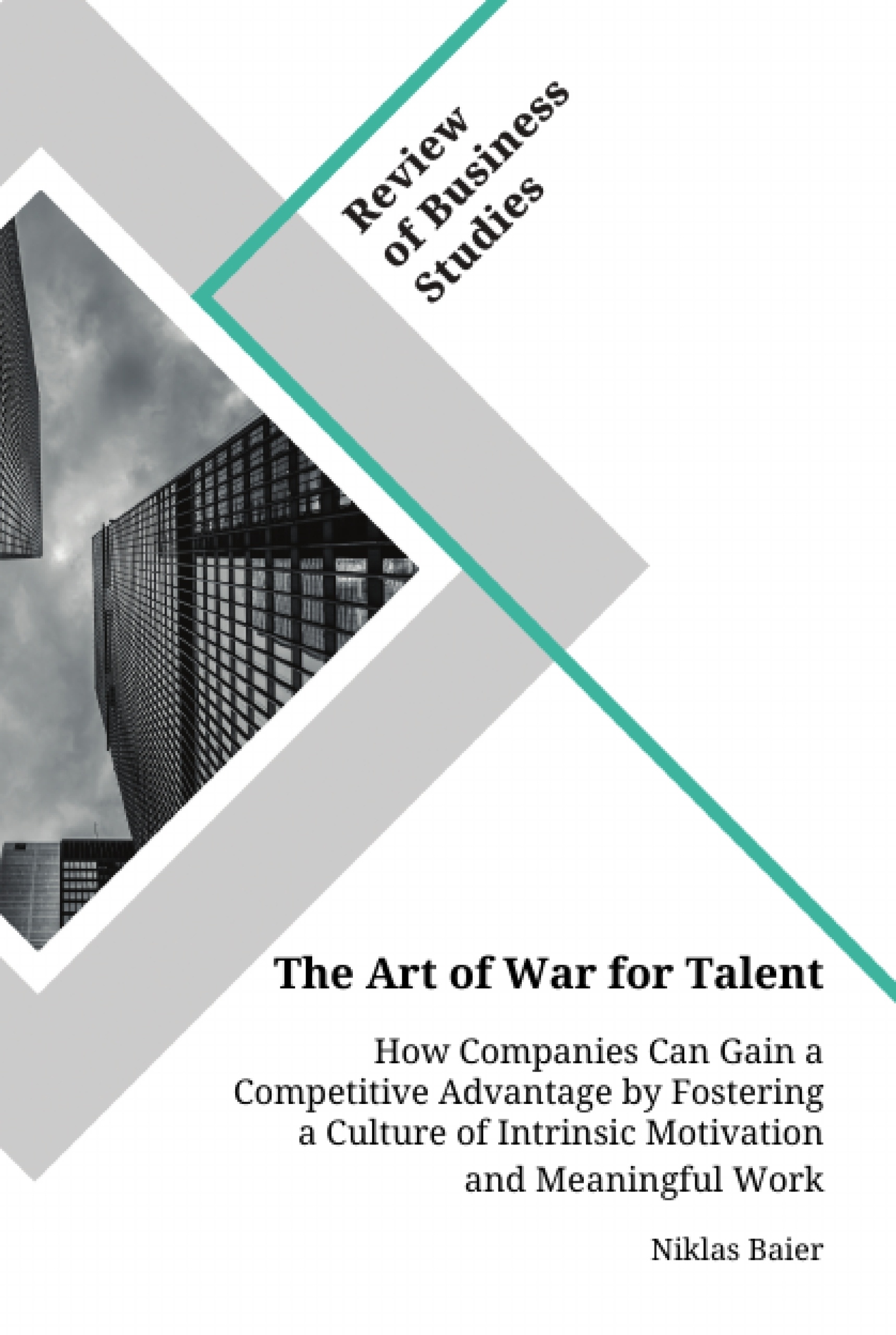The bachelor thesis combines theories, literature, lab and field experiments, event studies from the industry, and its very own empirical research to argue from both, a strategic as well as a financial perspective, that an inimitable organizational culture of intrinsic motivation and meaningful work may constitute a source of competitive advantage within the War for Talent.
The thesis strives at highlighting the importance for firms to adapt to the newly emerged competitive environment that the ongoing War for Talent has created by considering their people as their most valuable asset for the success of the organization, as already hinted at throughout "The Art of War" by Sun Tzu in 500 BC; hence the reference in the title of this thesis.
After a brief review of the circumstances that led to the emergence of the War for Talent and first implications for the industry, it is argued from a strategic perspective why motivated talent depicts the key resource for competitive advantage and why conventional extrinsic incentive measures aimed at maximizing productivity are no longer effective. Afterwards, a proposition will be made of how capitalizing on intrinsic motivation, human’s inner drive to accomplish inherently interesting and challenging tasks, fostered through a framework of meaningful work, might be the decisive driver to get ahead in the quest for talent.
A second string of argumentation draws a connection between meaningful work and superior financial performance. This proposition is then tested by an empirical analysis, comparing the financial performance of publicly traded companies featured on the 2017 Fortune 100 Best Companies to Work For list against a control portfolio and the broad market, confirming significant differences for cumulative stock returns.
Inhaltsverzeichnis (Table of Contents)
- 1 INTRODUCTION.
- 2 THE WAR FOR TALENT.
- 2.1 Background Information.
- 2.2 A Purpose-Driven Approach.....
- 2.3 Employee Value Proposition Rankings……………………..\li>
- 2.4 Event Study: The Big Poaching Four..\li>
- 3 IMPLICATIONS FOR STRATEGIC MANAGEMENT
- 3.1 The Resource-Based View of the Firm
- 3.2 The Irrational Agent Problem
- 3.3 Limits of Extrinsic Motivators.
- 4 A FRAMEWORK TO FOSTER INTRINSIC MOTIVATION
- 4.1 Meaningfulness in Working ..
- 4.2 Event Study: Higher Purpose at KPMG, Recognition at PwC
- 4.3 Meaningfulness at Work.
- 5 THE LINK TO FINANCIAL PERFORMANCE ...
- 6 EMPIRICAL ANALYSIS
- 6.1 Sample Selection & Matching Procedure
- 6.2 Methodology & Measures ...
- 6.2.1 Return on Assets (ROA)
- 6.2.2 Market-to-Book Ratio of Equity (P/B-Ratio)...
- 6.2.3 Total Shareholder Returns (Stock Returns).
- 6.2.4 Hypotheses
- 6.3 Statistical Analysis & Results
- 6.4 Implications & Limitations
Zielsetzung und Themenschwerpunkte (Objectives and Key Themes)
This bachelor thesis investigates how companies can gain a competitive advantage in the War for Talent by fostering a culture of intrinsic motivation and meaningful work. It combines theory, literature, lab and field experiments, and empirical research to argue that a culture of intrinsic motivation and meaningful work can be a source of competitive advantage both strategically and financially.
- The importance of intrinsic motivation and meaningful work in attracting and retaining highly-skilled employees.
- The potential of a purpose-driven approach to creating a compelling employee value proposition.
- The limitations of extrinsic motivators in fostering long-term employee engagement.
- The impact of a culture of intrinsic motivation and meaningful work on financial performance.
- An empirical analysis examining the financial performance of companies featured on the Fortune Best Companies to Work For list.
Zusammenfassung der Kapitel (Chapter Summaries)
Chapter 1 introduces the topic of the War for Talent and its relevance in today's business environment. Chapter 2 explores the concept of a purpose-driven approach to attracting and retaining employees, examining the role of employee value proposition rankings and providing case studies of successful companies. Chapter 3 delves into the strategic implications of fostering intrinsic motivation and meaningful work, discussing frameworks like the Resource-Based View of the Firm and exploring the limitations of traditional extrinsic motivators. Chapter 4 introduces a framework for fostering intrinsic motivation through meaningful work, including case studies of successful companies like KPMG and PwC. Chapter 5 discusses the link between a culture of intrinsic motivation and meaningful work and financial performance. Chapter 6 presents an empirical analysis examining the financial performance of companies featured on the Fortune Best Companies to Work For list, providing insights into the potential impact of a purpose-driven approach on stock market performance.
Schlüsselwörter (Keywords)
This thesis focuses on key concepts such as intrinsic motivation, meaningful work, employee value proposition, War for Talent, strategic management, financial performance, empirical research, and the Fortune Best Companies to Work For list.
Frequently Asked Questions
What is the "War for Talent"?
The War for Talent describes the intense competition between companies to attract and retain highly-skilled employees in an increasingly complex global market.
How can a company gain a competitive advantage in this war?
By fostering an inimitable organizational culture focused on intrinsic motivation and providing meaningful work that aligns with employees' personal values.
Why are extrinsic motivators no longer enough?
Traditional incentives like salary and bonuses have limits in fostering long-term engagement and productivity, especially for modern talent seeking purpose.
What is a "Purpose-Driven Approach"?
It involves defining a clear organizational mission that goes beyond profit, making the work inherently interesting and valuable to the employee.
Is there a link between meaningful work and financial performance?
Yes, the thesis shows that companies on the "Fortune 100 Best Companies to Work For" list often achieve significantly higher cumulative stock returns than the market average.
How does the "Resource-Based View" apply to talent?
It argues that people are the most valuable asset because motivated talent is a rare, valuable, and hard-to-imitate resource for any organization.
- Quote paper
- Niklas Baier (Author), 2019, The Art of War for Talent. How Companies Can Gain a Competitive Advantage by Fostering a Culture of Intrinsic Motivation and Meaningful Work, Munich, GRIN Verlag, https://www.grin.com/document/540206



